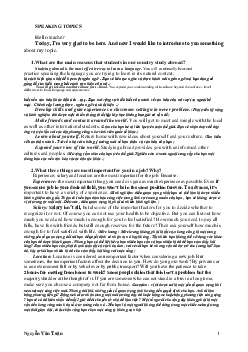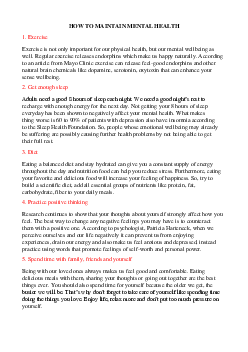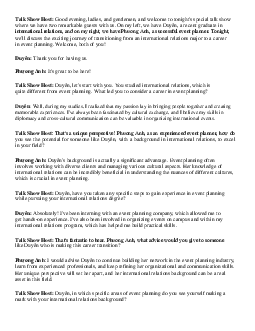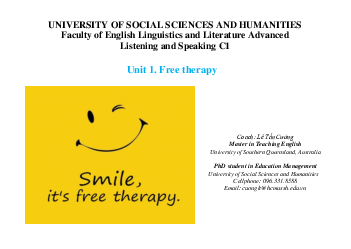


















Preview text:
lOMoAR cPSD| 41487147
List of common synonyms in the IELTS Test
1. common = universal, ubiquitous(if something is ubiquitous, it seems to be every where)
2. abundant = ample (enough and usually extra), plentiful (enough for people’s needs and wants)
3. near = adjacent (two things next to each other), adjoin(the same as adjacent)
4. pursue = woo (man woos woman, old-fashioned), seek (if you seek sth, you try to obtain it. FORMAL)
5. accurate = precise (precise is exact and accurate in all details), exact (correct in every detail)
6. opinion = perspective, standpoint(means looking at an event or situation in a particular way)
7. fame = prestige (describe those who are admired), reputation
8. primary = radical (very important and great in degree), fundamental
9. big = massive (large in size, quantity, or extent), colossal (use this word, you emphasize
something’s large), tremendous (informal)
10. stop = cease (if something ceases, it stops happening or existing)
11. based on = derived from (can see or notice them very easily)
12. careful = cautious (very careful in order to avoid danger), prudent(careful and sensible)
13. diverse = miscellaneous (a miscellaneous groups consists of many different kinds of things)
14. possible = feasible (if something is feasible, it can be done, made or achieved)
15. so = consequently, accordingly lOMoAR cPSD| 41487147
Question 1: Do you like art?
==> To be honest, I do have a soft spot for art. I
cannot say that I’m a skillful painter or anything, but I
do draw every now and then. When I was younger I
didn’t really know how to define art, but it grew on me
and now I can even create some one-of-a-kind
artworks for house decoration. lOMoAR cPSD| 41487147
Question 2: Do you like visiting art galleries?
==> Yes, I enjoy visiting art galleries as I find it a
great way to appreciate and learn about different forms
of art. It also provides me with a chance to explore
various cultures and historical periods. Also, I find
it relaxing and inspiring to spend time surrounded
by beautiful and thought-provoking works of art.” lOMoAR cPSD| 41487147
Question 3: Do you want to be an artist?
==> No, I don't aspire to be an artist. While I appreciate
the beauty and creativity of art, it's not something that I
feel a strong passion for. My interests lie more in the areas
of science and technology, and I hope to pursue a career in those fields.” lOMoAR cPSD| 41487147
Question 4: Do you like modern art or traditional
art? ==> I appreciate both modern and traditional art
for different reasons. While traditional art reflects
cultural heritage and history, modern art is often bold
and thought-provoking. However, I tend to enjoy
traditional art more as it helps me understand the roots of
our society and culture. lOMoAR cPSD| 41487147
Question 5: What benefits can you get from painting as a hobby?
==> I learned that there are some psychological
effects colors might have on our emotions. By saying this,
I mean it can uplift my mood only by mixing and playing
with different shades of red, yellow, green or blue. And
painting has been extremely useful in helping me
to increase my attention span, you know, because it often
takes days or even months to finish a proper drawing. lOMoAR cPSD| 41487147
Dealing with IELTS Listening Distractors lOMoARcPSD|414 871 47 lOMoARcPSD|414 871 47 lOMoARcPSD|414 871 47 lOMoARcPSD|414 871 47 lOMoARcPSD|414 871 47 lOMoARcPSD|414 871 47 lOMoARcPSD|414 871 47 lOMoARcPSD|414 871 47 lOMoARcPSD|414 871 47 lOMoAR cPSD| 41487147
Nice sentences/ phrases in Unit 6
1. These foods are often rich in rutrients.
2. Would you agree or disagree that, these days, people often discard things that still have value?
3. Think of a time when you chose not to act in a conventional way.
4. What is the environmental impact of fish farming?
5. In what ways, if any, has the global food crisis affected your country?
6. Winning the lottery is many people’s dream. Are there any drawbacks to winning?
7. If you could choose several foods to feast on, which ones would you choose? Why?
8. Are you more of a realist or an idealist?
9. Personally, I’m neutral on the value of technology as a potential solution to the food crisis.
10. These include people not having access to enough food.
11. One technology that fascinates me is 3D printing.
12. Traditional agriculture involves either growing plants or raising animals for food.
13. I even read that companies are developing LED lightbulbs for this kind of farming.
14. There’s almost nothing left.
15. No one could give me a straight answer.
16. How do you measure success?
17. He made a big understatement.
18. What we need now is a radically new conception of agriculture.
19. I asked him how he became such an expert on fish.
20. Food can be produced close to where people live, reducing energy and pollution costs from transportation and distribution lOMoAR cPSD| 41487147
UNIVERSITY OF SOCIAL SCIENCES AND
HUMANITIES Faculty of English Linguistics and
Literature Advanced Listening and Speaking C1
Unit 7. A GOOD REPUTATION
Coach: Lê Tấn Cường
Master in Teaching English
University of Southern Queensland, Australia
PhD student in Education Management
University of Social Sciences and Humanities
Cellphone: 096.331.8588
Email: cuonglt@hcmussh.edu.vn lOMoARcPSD|414 871 47 DISCUSSION QUESTIONS
1. Do you think it is easier to get a good reputation or to lose one? Why? 2. What do you think we can benefit from greatest piece of art?
3. Why is it said that trust and reputation are currencies in the new economy? 4. Are you influenced by anyone who has a good reputation? How?




